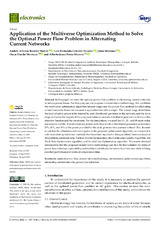Application of the Multiverse Optimization Method to Solve the Optimal Power Flow Problem in Alternating Current Networks
Autor
Rosales-Muñoz, Andrés Alfonso
Grisales-Noreña, Luis Fernando
Montano, Jhon
Montoya, Oscar Danilo
Perea Moreno, Alberto Jesús
Editor
MDPIFecha
2022Materia
Optimal power flowMaster–slave methodology
Metaheuristic optimization algorithms
Alternating current networks
Power loss reduction
METS:
Mostrar el registro METSPREMIS:
Mostrar el registro PREMISMetadatos
Mostrar el registro completo del ítemResumen
In this paper, we solve the optimal power flow problem in alternating current networks to reduce power losses. For that purpose, we propose a master–slave methodology that combines the multiverse optimization algorithm (master stage) and the power flow method for alternating current networks based on successive approximation (slave stage). The master stage determines the level of active power to be injected by each distributed generator in the network, and the slave stage evaluates the impact of the proposed solution on each distributed generator in terms of the objective function and the constraints. For the simulations, we used the 10-, 33-, and 69-node radial test systems and the 10-node mesh test system with three levels of distributed generation penetration: 20%, 40%, and 60% of the power provided by the slack generator in a scenario without DGs. In order to validate the robustness and convergence of the proposed optimization algorithm, we compared it with four other optimization methods that have been reported in the specialized literature to solve the problem addressed here: Particle Swarm Optimization, the Continuous Genetic Algorithm, the Black Hole Optimization algorithm, and the Ant Lion Optimization algorithm. The results obtained demonstrate that the proposed master–slave methodology can find the best solution (in terms of power loss reduction, repeatability, and technical conditions) for networks of any size while offering excellent performance in terms of computation time.

